University of Newcastle Business Law Case Study Analysis (PACC 6009)
VerifiedAdded on 2023/01/17
|8
|2304
|1
Case Study
AI Summary
This case study analyzes a legal dispute involving Zach Coventry, a professional gamer, and Handy Hardware Supplies Pty Ltd. Zach purchased a gaming PC from HH, relying on their guarantee of satisfaction. However, the PC malfunctioned, leading to Zach's failure in a competition. The analysis examines contract terms, including the enforceability of the "satisfaction guaranteed" statement, and the application of the parole evidence rule. It considers the validity of exclusion clauses and the potential for unconscionable conduct by HH. The case explores whether Zach can succeed in his legal claim, focusing on breach of contract, misrepresentation, and the remedies available to him, including compensation for financial losses and the impact of the exclusion clause. The analysis also considers the unconscionable conduct of HH in forcing Zach to buy a new CPU in lieu of a certificate. Ultimately, the case concludes that Zach has grounds for a successful legal claim and is likely entitled to compensation.
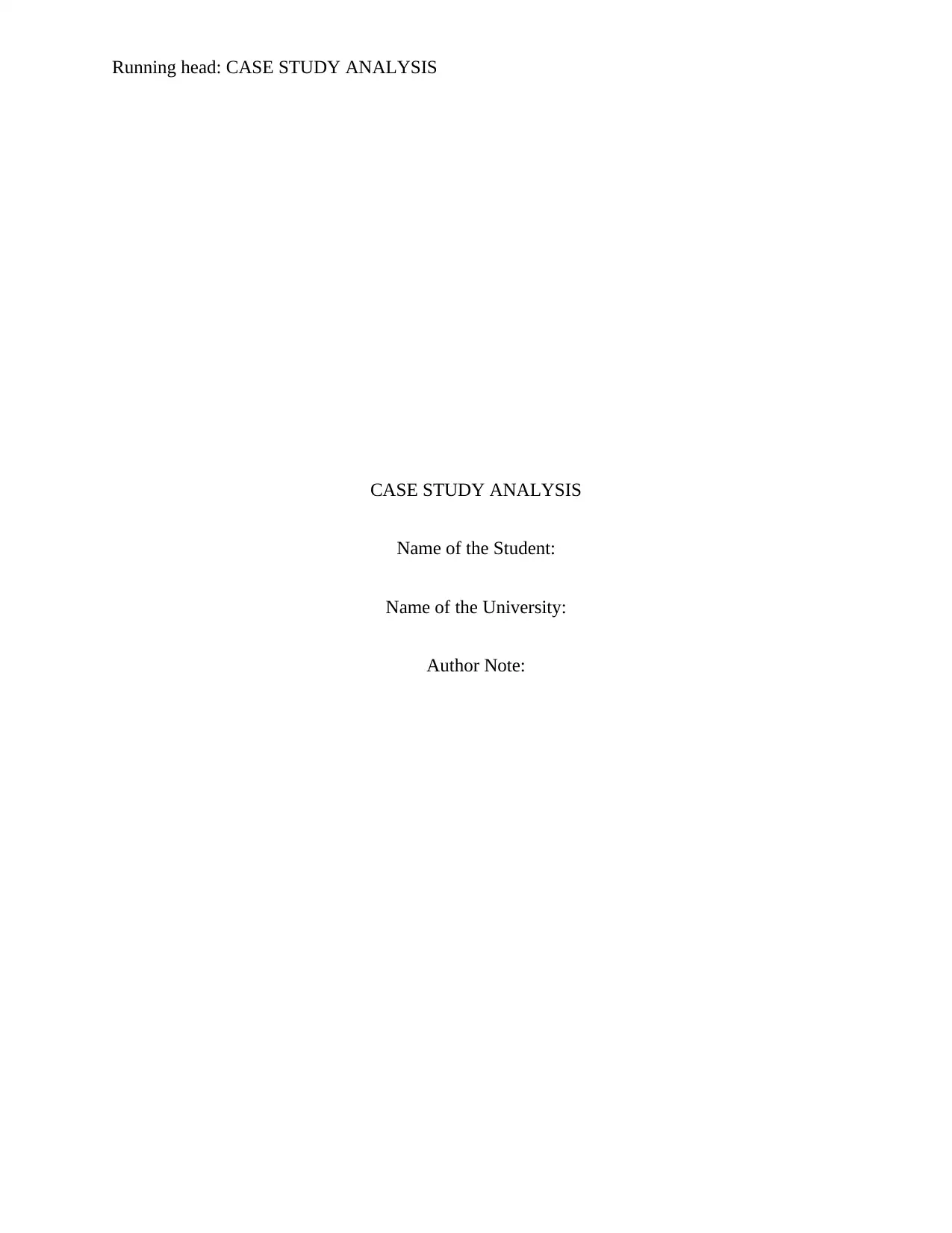
Running head: CASE STUDY ANALYSIS
CASE STUDY ANALYSIS
Name of the Student:
Name of the University:
Author Note:
CASE STUDY ANALYSIS
Name of the Student:
Name of the University:
Author Note:
Paraphrase This Document
Need a fresh take? Get an instant paraphrase of this document with our AI Paraphraser
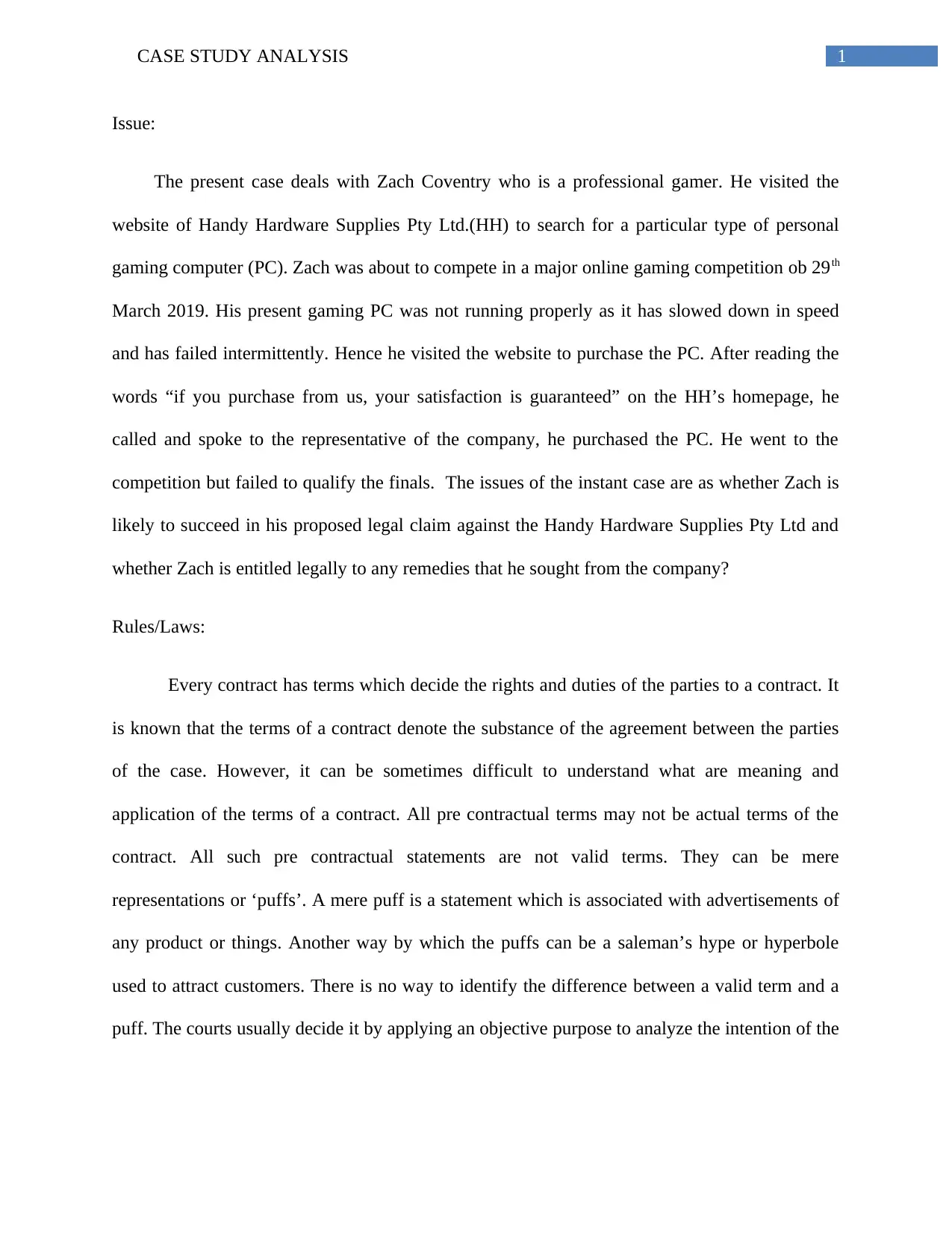
1CASE STUDY ANALYSIS
Issue:
The present case deals with Zach Coventry who is a professional gamer. He visited the
website of Handy Hardware Supplies Pty Ltd.(HH) to search for a particular type of personal
gaming computer (PC). Zach was about to compete in a major online gaming competition ob 29th
March 2019. His present gaming PC was not running properly as it has slowed down in speed
and has failed intermittently. Hence he visited the website to purchase the PC. After reading the
words “if you purchase from us, your satisfaction is guaranteed” on the HH’s homepage, he
called and spoke to the representative of the company, he purchased the PC. He went to the
competition but failed to qualify the finals. The issues of the instant case are as whether Zach is
likely to succeed in his proposed legal claim against the Handy Hardware Supplies Pty Ltd and
whether Zach is entitled legally to any remedies that he sought from the company?
Rules/Laws:
Every contract has terms which decide the rights and duties of the parties to a contract. It
is known that the terms of a contract denote the substance of the agreement between the parties
of the case. However, it can be sometimes difficult to understand what are meaning and
application of the terms of a contract. All pre contractual terms may not be actual terms of the
contract. All such pre contractual statements are not valid terms. They can be mere
representations or ‘puffs’. A mere puff is a statement which is associated with advertisements of
any product or things. Another way by which the puffs can be a saleman’s hype or hyperbole
used to attract customers. There is no way to identify the difference between a valid term and a
puff. The courts usually decide it by applying an objective purpose to analyze the intention of the
Issue:
The present case deals with Zach Coventry who is a professional gamer. He visited the
website of Handy Hardware Supplies Pty Ltd.(HH) to search for a particular type of personal
gaming computer (PC). Zach was about to compete in a major online gaming competition ob 29th
March 2019. His present gaming PC was not running properly as it has slowed down in speed
and has failed intermittently. Hence he visited the website to purchase the PC. After reading the
words “if you purchase from us, your satisfaction is guaranteed” on the HH’s homepage, he
called and spoke to the representative of the company, he purchased the PC. He went to the
competition but failed to qualify the finals. The issues of the instant case are as whether Zach is
likely to succeed in his proposed legal claim against the Handy Hardware Supplies Pty Ltd and
whether Zach is entitled legally to any remedies that he sought from the company?
Rules/Laws:
Every contract has terms which decide the rights and duties of the parties to a contract. It
is known that the terms of a contract denote the substance of the agreement between the parties
of the case. However, it can be sometimes difficult to understand what are meaning and
application of the terms of a contract. All pre contractual terms may not be actual terms of the
contract. All such pre contractual statements are not valid terms. They can be mere
representations or ‘puffs’. A mere puff is a statement which is associated with advertisements of
any product or things. Another way by which the puffs can be a saleman’s hype or hyperbole
used to attract customers. There is no way to identify the difference between a valid term and a
puff. The courts usually decide it by applying an objective purpose to analyze the intention of the
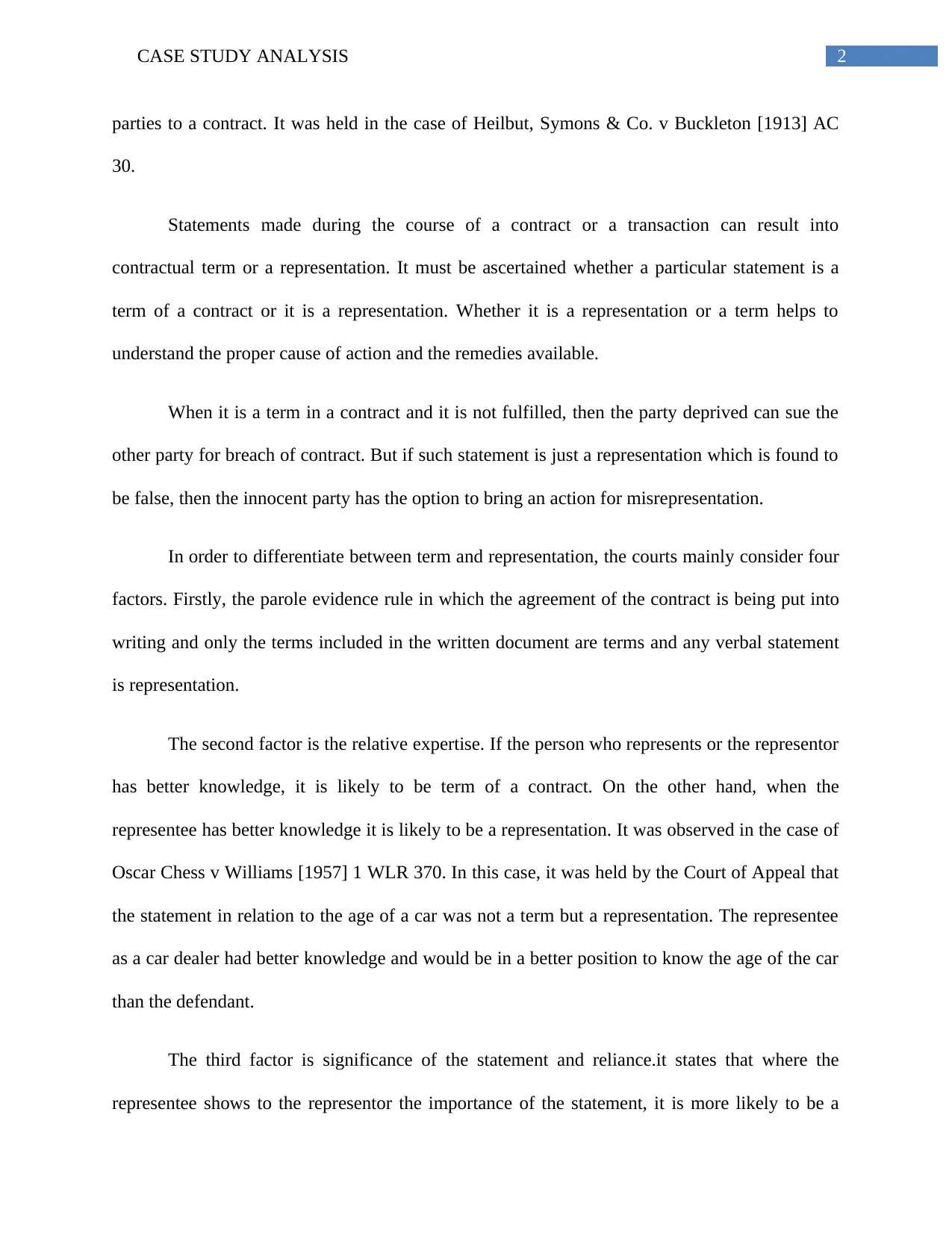
2CASE STUDY ANALYSIS
parties to a contract. It was held in the case of Heilbut, Symons & Co. v Buckleton [1913] AC
30.
Statements made during the course of a contract or a transaction can result into
contractual term or a representation. It must be ascertained whether a particular statement is a
term of a contract or it is a representation. Whether it is a representation or a term helps to
understand the proper cause of action and the remedies available.
When it is a term in a contract and it is not fulfilled, then the party deprived can sue the
other party for breach of contract. But if such statement is just a representation which is found to
be false, then the innocent party has the option to bring an action for misrepresentation.
In order to differentiate between term and representation, the courts mainly consider four
factors. Firstly, the parole evidence rule in which the agreement of the contract is being put into
writing and only the terms included in the written document are terms and any verbal statement
is representation.
The second factor is the relative expertise. If the person who represents or the representor
has better knowledge, it is likely to be term of a contract. On the other hand, when the
representee has better knowledge it is likely to be a representation. It was observed in the case of
Oscar Chess v Williams [1957] 1 WLR 370. In this case, it was held by the Court of Appeal that
the statement in relation to the age of a car was not a term but a representation. The representee
as a car dealer had better knowledge and would be in a better position to know the age of the car
than the defendant.
The third factor is significance of the statement and reliance.it states that where the
representee shows to the representor the importance of the statement, it is more likely to be a
parties to a contract. It was held in the case of Heilbut, Symons & Co. v Buckleton [1913] AC
30.
Statements made during the course of a contract or a transaction can result into
contractual term or a representation. It must be ascertained whether a particular statement is a
term of a contract or it is a representation. Whether it is a representation or a term helps to
understand the proper cause of action and the remedies available.
When it is a term in a contract and it is not fulfilled, then the party deprived can sue the
other party for breach of contract. But if such statement is just a representation which is found to
be false, then the innocent party has the option to bring an action for misrepresentation.
In order to differentiate between term and representation, the courts mainly consider four
factors. Firstly, the parole evidence rule in which the agreement of the contract is being put into
writing and only the terms included in the written document are terms and any verbal statement
is representation.
The second factor is the relative expertise. If the person who represents or the representor
has better knowledge, it is likely to be term of a contract. On the other hand, when the
representee has better knowledge it is likely to be a representation. It was observed in the case of
Oscar Chess v Williams [1957] 1 WLR 370. In this case, it was held by the Court of Appeal that
the statement in relation to the age of a car was not a term but a representation. The representee
as a car dealer had better knowledge and would be in a better position to know the age of the car
than the defendant.
The third factor is significance of the statement and reliance.it states that where the
representee shows to the representor the importance of the statement, it is more likely to be a
⊘ This is a preview!⊘
Do you want full access?
Subscribe today to unlock all pages.

Trusted by 1+ million students worldwide
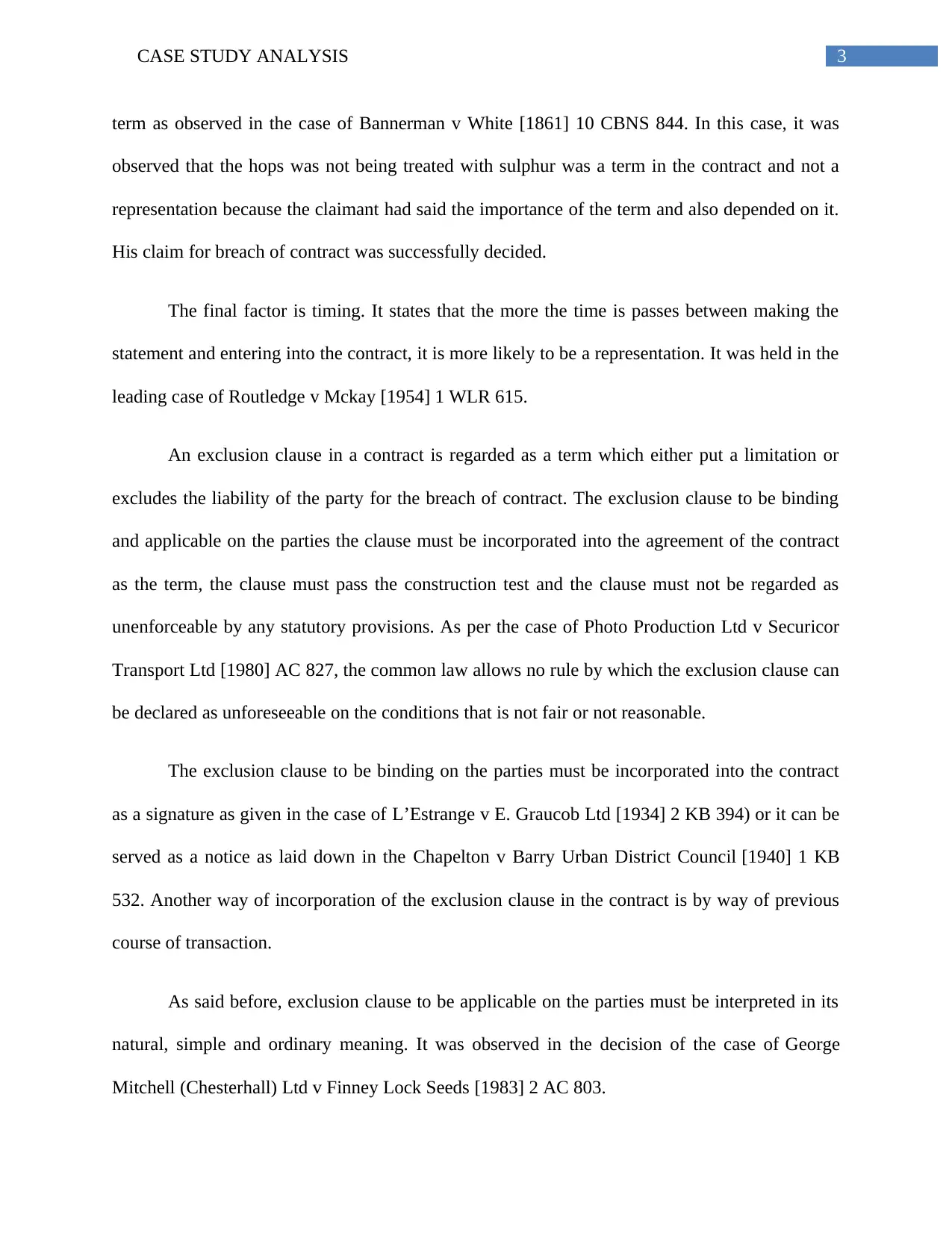
3CASE STUDY ANALYSIS
term as observed in the case of Bannerman v White [1861] 10 CBNS 844. In this case, it was
observed that the hops was not being treated with sulphur was a term in the contract and not a
representation because the claimant had said the importance of the term and also depended on it.
His claim for breach of contract was successfully decided.
The final factor is timing. It states that the more the time is passes between making the
statement and entering into the contract, it is more likely to be a representation. It was held in the
leading case of Routledge v Mckay [1954] 1 WLR 615.
An exclusion clause in a contract is regarded as a term which either put a limitation or
excludes the liability of the party for the breach of contract. The exclusion clause to be binding
and applicable on the parties the clause must be incorporated into the agreement of the contract
as the term, the clause must pass the construction test and the clause must not be regarded as
unenforceable by any statutory provisions. As per the case of Photo Production Ltd v Securicor
Transport Ltd [1980] AC 827, the common law allows no rule by which the exclusion clause can
be declared as unforeseeable on the conditions that is not fair or not reasonable.
The exclusion clause to be binding on the parties must be incorporated into the contract
as a signature as given in the case of L’Estrange v E. Graucob Ltd [1934] 2 KB 394) or it can be
served as a notice as laid down in the Chapelton v Barry Urban District Council [1940] 1 KB
532. Another way of incorporation of the exclusion clause in the contract is by way of previous
course of transaction.
As said before, exclusion clause to be applicable on the parties must be interpreted in its
natural, simple and ordinary meaning. It was observed in the decision of the case of George
Mitchell (Chesterhall) Ltd v Finney Lock Seeds [1983] 2 AC 803.
term as observed in the case of Bannerman v White [1861] 10 CBNS 844. In this case, it was
observed that the hops was not being treated with sulphur was a term in the contract and not a
representation because the claimant had said the importance of the term and also depended on it.
His claim for breach of contract was successfully decided.
The final factor is timing. It states that the more the time is passes between making the
statement and entering into the contract, it is more likely to be a representation. It was held in the
leading case of Routledge v Mckay [1954] 1 WLR 615.
An exclusion clause in a contract is regarded as a term which either put a limitation or
excludes the liability of the party for the breach of contract. The exclusion clause to be binding
and applicable on the parties the clause must be incorporated into the agreement of the contract
as the term, the clause must pass the construction test and the clause must not be regarded as
unenforceable by any statutory provisions. As per the case of Photo Production Ltd v Securicor
Transport Ltd [1980] AC 827, the common law allows no rule by which the exclusion clause can
be declared as unforeseeable on the conditions that is not fair or not reasonable.
The exclusion clause to be binding on the parties must be incorporated into the contract
as a signature as given in the case of L’Estrange v E. Graucob Ltd [1934] 2 KB 394) or it can be
served as a notice as laid down in the Chapelton v Barry Urban District Council [1940] 1 KB
532. Another way of incorporation of the exclusion clause in the contract is by way of previous
course of transaction.
As said before, exclusion clause to be applicable on the parties must be interpreted in its
natural, simple and ordinary meaning. It was observed in the decision of the case of George
Mitchell (Chesterhall) Ltd v Finney Lock Seeds [1983] 2 AC 803.
Paraphrase This Document
Need a fresh take? Get an instant paraphrase of this document with our AI Paraphraser
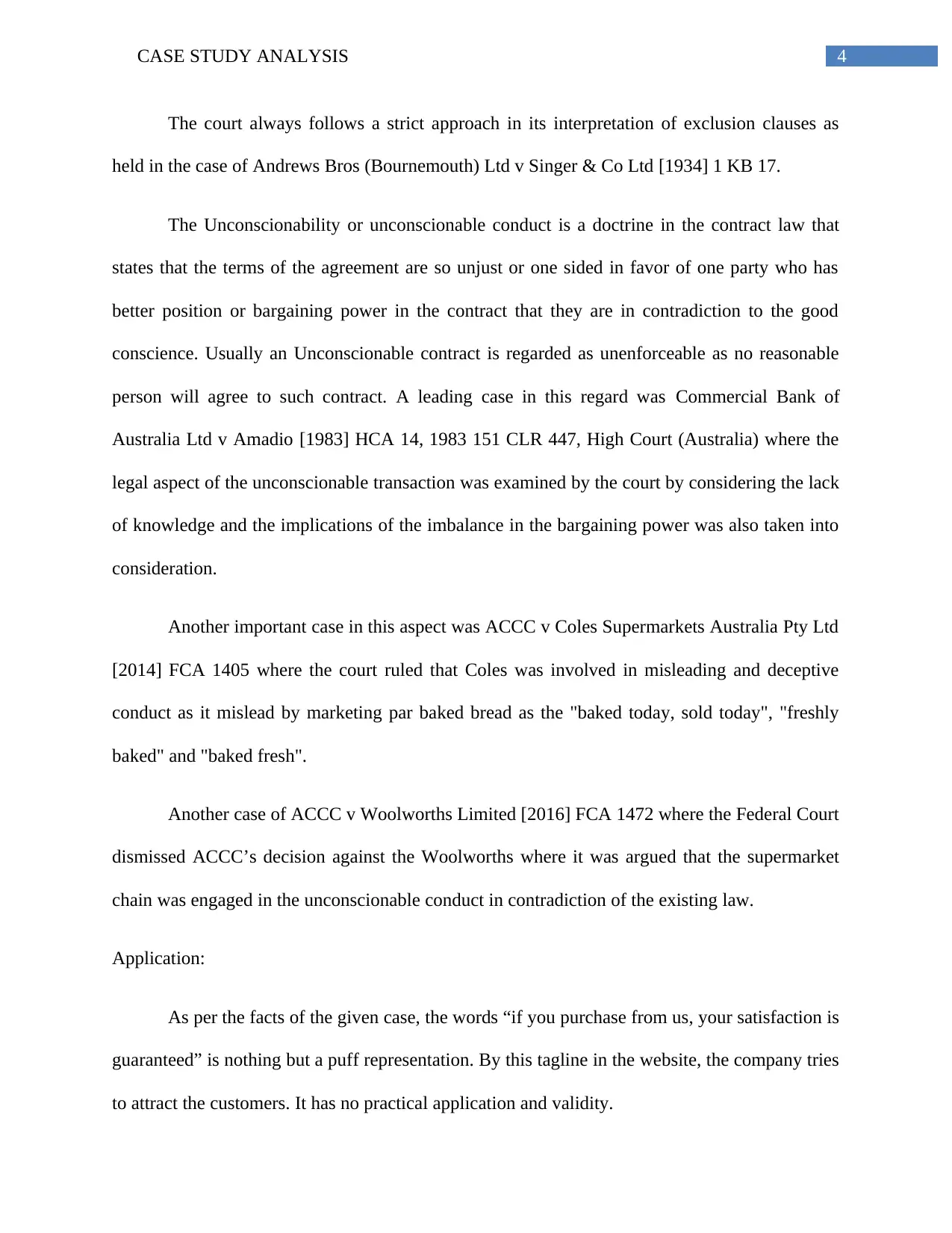
4CASE STUDY ANALYSIS
The court always follows a strict approach in its interpretation of exclusion clauses as
held in the case of Andrews Bros (Bournemouth) Ltd v Singer & Co Ltd [1934] 1 KB 17.
The Unconscionability or unconscionable conduct is a doctrine in the contract law that
states that the terms of the agreement are so unjust or one sided in favor of one party who has
better position or bargaining power in the contract that they are in contradiction to the good
conscience. Usually an Unconscionable contract is regarded as unenforceable as no reasonable
person will agree to such contract. A leading case in this regard was Commercial Bank of
Australia Ltd v Amadio [1983] HCA 14, 1983 151 CLR 447, High Court (Australia) where the
legal aspect of the unconscionable transaction was examined by the court by considering the lack
of knowledge and the implications of the imbalance in the bargaining power was also taken into
consideration.
Another important case in this aspect was ACCC v Coles Supermarkets Australia Pty Ltd
[2014] FCA 1405 where the court ruled that Coles was involved in misleading and deceptive
conduct as it mislead by marketing par baked bread as the "baked today, sold today", "freshly
baked" and "baked fresh".
Another case of ACCC v Woolworths Limited [2016] FCA 1472 where the Federal Court
dismissed ACCC’s decision against the Woolworths where it was argued that the supermarket
chain was engaged in the unconscionable conduct in contradiction of the existing law.
Application:
As per the facts of the given case, the words “if you purchase from us, your satisfaction is
guaranteed” is nothing but a puff representation. By this tagline in the website, the company tries
to attract the customers. It has no practical application and validity.
The court always follows a strict approach in its interpretation of exclusion clauses as
held in the case of Andrews Bros (Bournemouth) Ltd v Singer & Co Ltd [1934] 1 KB 17.
The Unconscionability or unconscionable conduct is a doctrine in the contract law that
states that the terms of the agreement are so unjust or one sided in favor of one party who has
better position or bargaining power in the contract that they are in contradiction to the good
conscience. Usually an Unconscionable contract is regarded as unenforceable as no reasonable
person will agree to such contract. A leading case in this regard was Commercial Bank of
Australia Ltd v Amadio [1983] HCA 14, 1983 151 CLR 447, High Court (Australia) where the
legal aspect of the unconscionable transaction was examined by the court by considering the lack
of knowledge and the implications of the imbalance in the bargaining power was also taken into
consideration.
Another important case in this aspect was ACCC v Coles Supermarkets Australia Pty Ltd
[2014] FCA 1405 where the court ruled that Coles was involved in misleading and deceptive
conduct as it mislead by marketing par baked bread as the "baked today, sold today", "freshly
baked" and "baked fresh".
Another case of ACCC v Woolworths Limited [2016] FCA 1472 where the Federal Court
dismissed ACCC’s decision against the Woolworths where it was argued that the supermarket
chain was engaged in the unconscionable conduct in contradiction of the existing law.
Application:
As per the facts of the given case, the words “if you purchase from us, your satisfaction is
guaranteed” is nothing but a puff representation. By this tagline in the website, the company tries
to attract the customers. It has no practical application and validity.
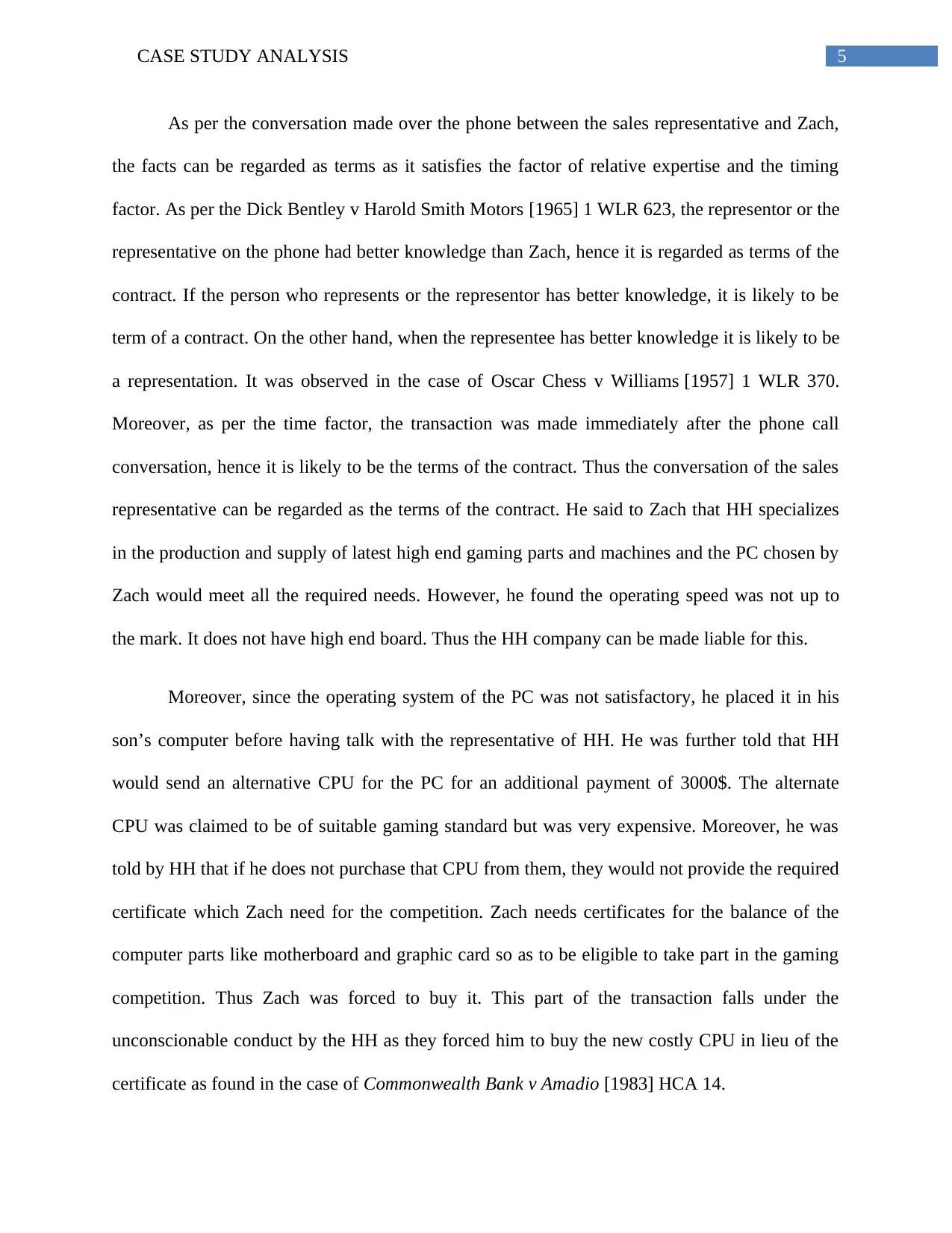
5CASE STUDY ANALYSIS
As per the conversation made over the phone between the sales representative and Zach,
the facts can be regarded as terms as it satisfies the factor of relative expertise and the timing
factor. As per the Dick Bentley v Harold Smith Motors [1965] 1 WLR 623, the representor or the
representative on the phone had better knowledge than Zach, hence it is regarded as terms of the
contract. If the person who represents or the representor has better knowledge, it is likely to be
term of a contract. On the other hand, when the representee has better knowledge it is likely to be
a representation. It was observed in the case of Oscar Chess v Williams [1957] 1 WLR 370.
Moreover, as per the time factor, the transaction was made immediately after the phone call
conversation, hence it is likely to be the terms of the contract. Thus the conversation of the sales
representative can be regarded as the terms of the contract. He said to Zach that HH specializes
in the production and supply of latest high end gaming parts and machines and the PC chosen by
Zach would meet all the required needs. However, he found the operating speed was not up to
the mark. It does not have high end board. Thus the HH company can be made liable for this.
Moreover, since the operating system of the PC was not satisfactory, he placed it in his
son’s computer before having talk with the representative of HH. He was further told that HH
would send an alternative CPU for the PC for an additional payment of 3000$. The alternate
CPU was claimed to be of suitable gaming standard but was very expensive. Moreover, he was
told by HH that if he does not purchase that CPU from them, they would not provide the required
certificate which Zach need for the competition. Zach needs certificates for the balance of the
computer parts like motherboard and graphic card so as to be eligible to take part in the gaming
competition. Thus Zach was forced to buy it. This part of the transaction falls under the
unconscionable conduct by the HH as they forced him to buy the new costly CPU in lieu of the
certificate as found in the case of Commonwealth Bank v Amadio [1983] HCA 14.
As per the conversation made over the phone between the sales representative and Zach,
the facts can be regarded as terms as it satisfies the factor of relative expertise and the timing
factor. As per the Dick Bentley v Harold Smith Motors [1965] 1 WLR 623, the representor or the
representative on the phone had better knowledge than Zach, hence it is regarded as terms of the
contract. If the person who represents or the representor has better knowledge, it is likely to be
term of a contract. On the other hand, when the representee has better knowledge it is likely to be
a representation. It was observed in the case of Oscar Chess v Williams [1957] 1 WLR 370.
Moreover, as per the time factor, the transaction was made immediately after the phone call
conversation, hence it is likely to be the terms of the contract. Thus the conversation of the sales
representative can be regarded as the terms of the contract. He said to Zach that HH specializes
in the production and supply of latest high end gaming parts and machines and the PC chosen by
Zach would meet all the required needs. However, he found the operating speed was not up to
the mark. It does not have high end board. Thus the HH company can be made liable for this.
Moreover, since the operating system of the PC was not satisfactory, he placed it in his
son’s computer before having talk with the representative of HH. He was further told that HH
would send an alternative CPU for the PC for an additional payment of 3000$. The alternate
CPU was claimed to be of suitable gaming standard but was very expensive. Moreover, he was
told by HH that if he does not purchase that CPU from them, they would not provide the required
certificate which Zach need for the competition. Zach needs certificates for the balance of the
computer parts like motherboard and graphic card so as to be eligible to take part in the gaming
competition. Thus Zach was forced to buy it. This part of the transaction falls under the
unconscionable conduct by the HH as they forced him to buy the new costly CPU in lieu of the
certificate as found in the case of Commonwealth Bank v Amadio [1983] HCA 14.
⊘ This is a preview!⊘
Do you want full access?
Subscribe today to unlock all pages.

Trusted by 1+ million students worldwide
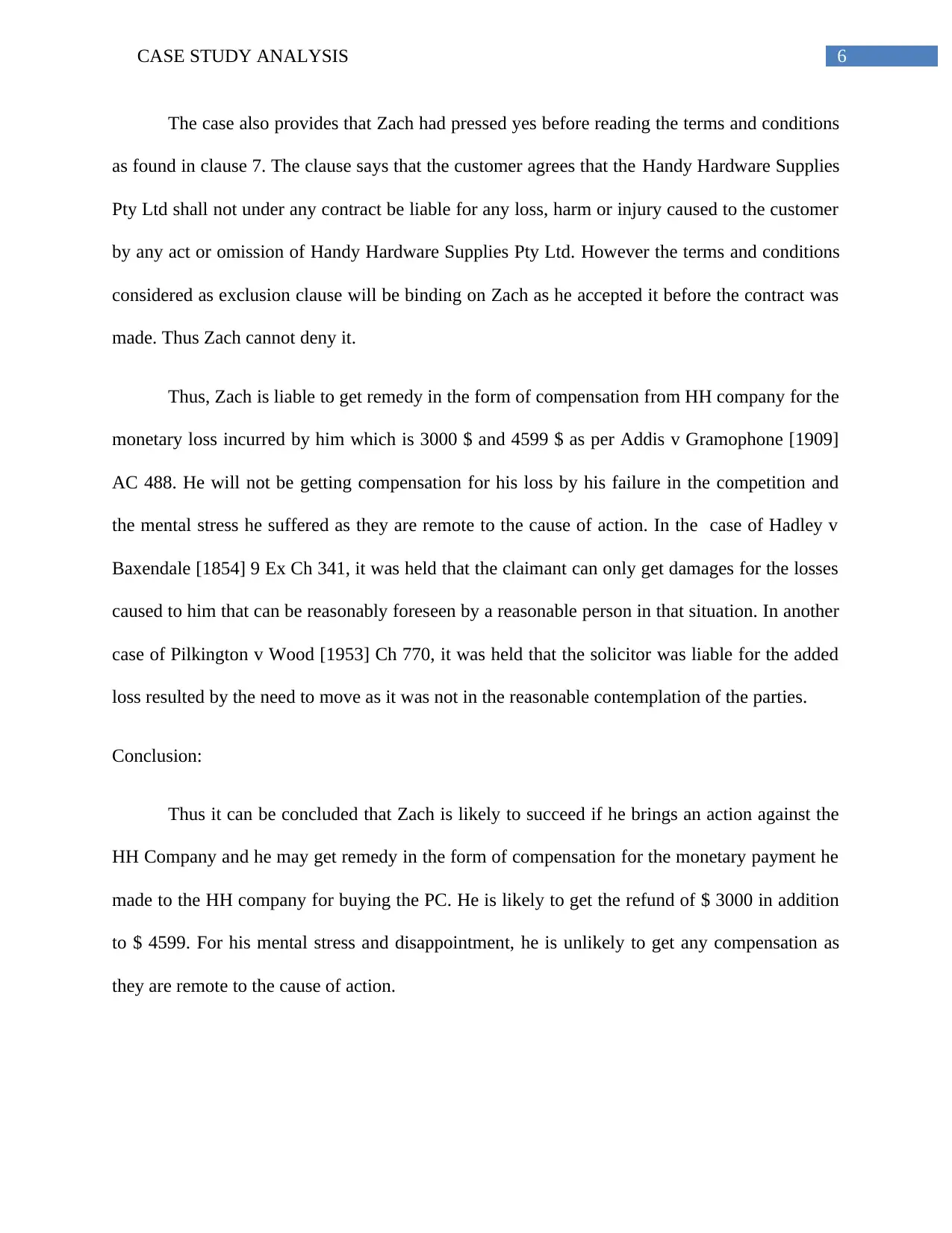
6CASE STUDY ANALYSIS
The case also provides that Zach had pressed yes before reading the terms and conditions
as found in clause 7. The clause says that the customer agrees that the Handy Hardware Supplies
Pty Ltd shall not under any contract be liable for any loss, harm or injury caused to the customer
by any act or omission of Handy Hardware Supplies Pty Ltd. However the terms and conditions
considered as exclusion clause will be binding on Zach as he accepted it before the contract was
made. Thus Zach cannot deny it.
Thus, Zach is liable to get remedy in the form of compensation from HH company for the
monetary loss incurred by him which is 3000 $ and 4599 $ as per Addis v Gramophone [1909]
AC 488. He will not be getting compensation for his loss by his failure in the competition and
the mental stress he suffered as they are remote to the cause of action. In the case of Hadley v
Baxendale [1854] 9 Ex Ch 341, it was held that the claimant can only get damages for the losses
caused to him that can be reasonably foreseen by a reasonable person in that situation. In another
case of Pilkington v Wood [1953] Ch 770, it was held that the solicitor was liable for the added
loss resulted by the need to move as it was not in the reasonable contemplation of the parties.
Conclusion:
Thus it can be concluded that Zach is likely to succeed if he brings an action against the
HH Company and he may get remedy in the form of compensation for the monetary payment he
made to the HH company for buying the PC. He is likely to get the refund of $ 3000 in addition
to $ 4599. For his mental stress and disappointment, he is unlikely to get any compensation as
they are remote to the cause of action.
The case also provides that Zach had pressed yes before reading the terms and conditions
as found in clause 7. The clause says that the customer agrees that the Handy Hardware Supplies
Pty Ltd shall not under any contract be liable for any loss, harm or injury caused to the customer
by any act or omission of Handy Hardware Supplies Pty Ltd. However the terms and conditions
considered as exclusion clause will be binding on Zach as he accepted it before the contract was
made. Thus Zach cannot deny it.
Thus, Zach is liable to get remedy in the form of compensation from HH company for the
monetary loss incurred by him which is 3000 $ and 4599 $ as per Addis v Gramophone [1909]
AC 488. He will not be getting compensation for his loss by his failure in the competition and
the mental stress he suffered as they are remote to the cause of action. In the case of Hadley v
Baxendale [1854] 9 Ex Ch 341, it was held that the claimant can only get damages for the losses
caused to him that can be reasonably foreseen by a reasonable person in that situation. In another
case of Pilkington v Wood [1953] Ch 770, it was held that the solicitor was liable for the added
loss resulted by the need to move as it was not in the reasonable contemplation of the parties.
Conclusion:
Thus it can be concluded that Zach is likely to succeed if he brings an action against the
HH Company and he may get remedy in the form of compensation for the monetary payment he
made to the HH company for buying the PC. He is likely to get the refund of $ 3000 in addition
to $ 4599. For his mental stress and disappointment, he is unlikely to get any compensation as
they are remote to the cause of action.
Paraphrase This Document
Need a fresh take? Get an instant paraphrase of this document with our AI Paraphraser
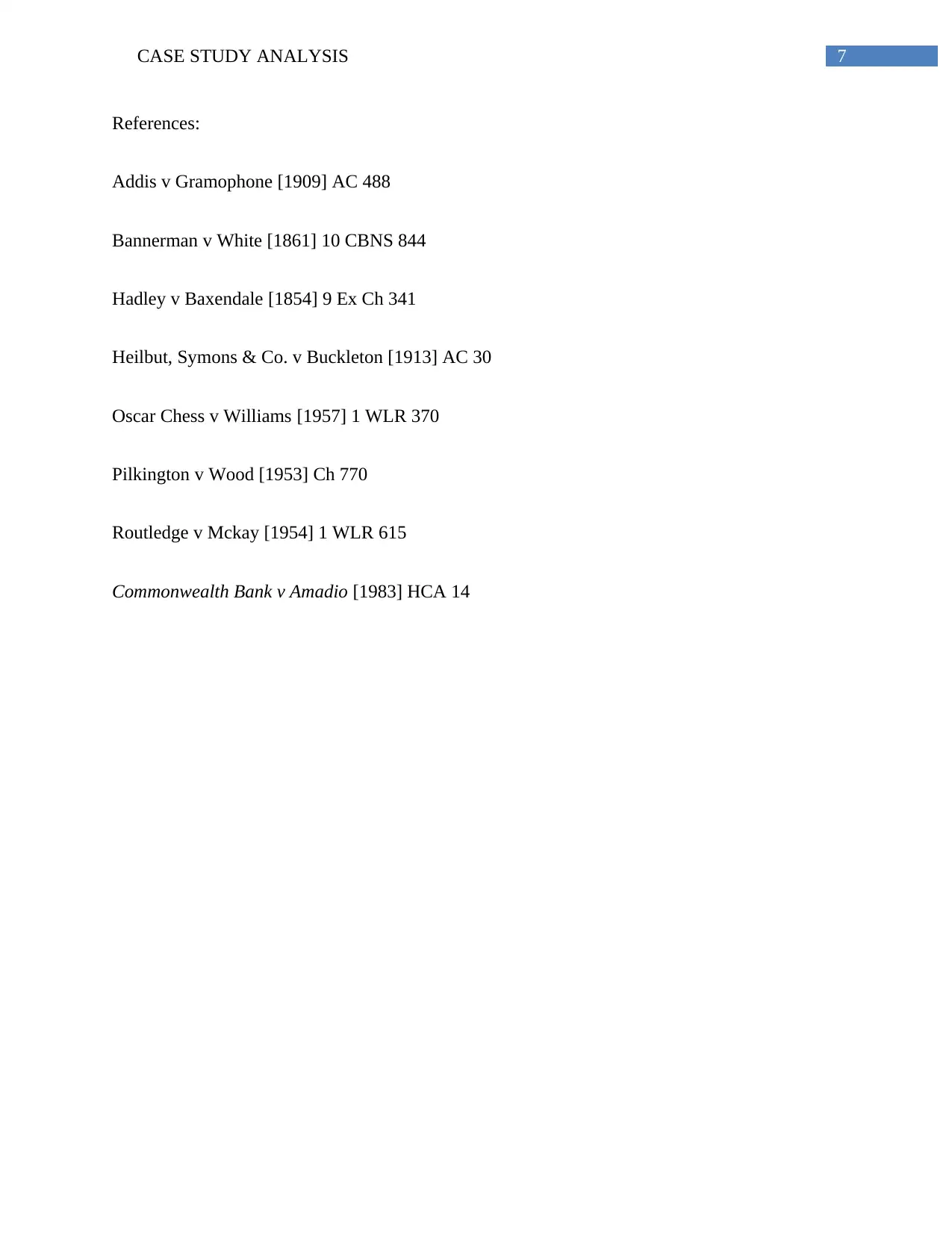
7CASE STUDY ANALYSIS
References:
Addis v Gramophone [1909] AC 488
Bannerman v White [1861] 10 CBNS 844
Hadley v Baxendale [1854] 9 Ex Ch 341
Heilbut, Symons & Co. v Buckleton [1913] AC 30
Oscar Chess v Williams [1957] 1 WLR 370
Pilkington v Wood [1953] Ch 770
Routledge v Mckay [1954] 1 WLR 615
Commonwealth Bank v Amadio [1983] HCA 14
References:
Addis v Gramophone [1909] AC 488
Bannerman v White [1861] 10 CBNS 844
Hadley v Baxendale [1854] 9 Ex Ch 341
Heilbut, Symons & Co. v Buckleton [1913] AC 30
Oscar Chess v Williams [1957] 1 WLR 370
Pilkington v Wood [1953] Ch 770
Routledge v Mckay [1954] 1 WLR 615
Commonwealth Bank v Amadio [1983] HCA 14
1 out of 8
Related Documents
Your All-in-One AI-Powered Toolkit for Academic Success.
+13062052269
info@desklib.com
Available 24*7 on WhatsApp / Email
![[object Object]](/_next/static/media/star-bottom.7253800d.svg)
Unlock your academic potential
Copyright © 2020–2026 A2Z Services. All Rights Reserved. Developed and managed by ZUCOL.





